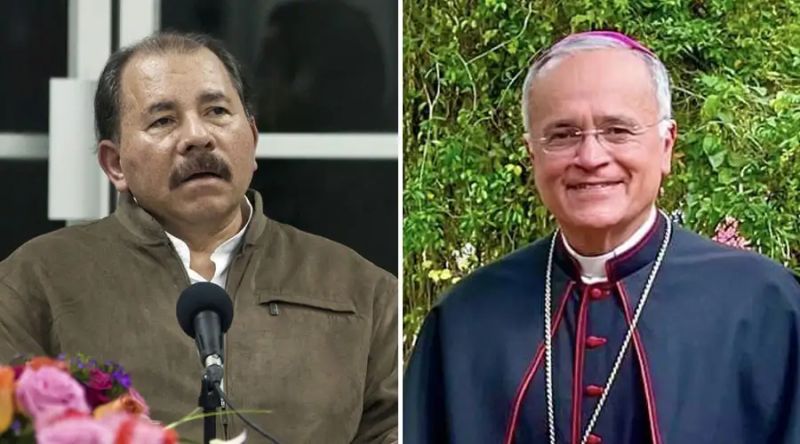
ACI Prensa Staff, Apr 18, 2023 / 17:00 pm (CNA).
Auxiliary Bishop Silvio Báez of Managua, Nicaragua, who is living in exile in the United States, responded to new verbal attacks by Nicaraguan dictator Daniel Ortega saying they are signs of the weakness and desperation of the president of the Central American country.
“We Nicaraguans have to learn to interpret the language of the dictator. He speaks for the people that are with him, he speaks for his base; he doesn’t speak as a statesman for the country, because he doesn’t govern in Nicaragua,” Báez said in an April 16 statement to the press in Miami.
“When he says these things, you have to interpret that it’s for his people, so they see him as strong. And deep down, those of us who hear him must think that it’s a sign of weakness, a sign of desperation. He knows that he is alone inside and outside the country,” the Nicaraguan prelate stressed.
On April 15, Ortega again attacked the Catholic Church in the context of a meeting he held with Luo Zhaohui, president of the China International Development Cooperation Agency.
During the meeting, Ortega attacked the bishops of Nicaragua and said that Bishop Rolando Álvarez of Matalgalpa, unjustly sentenced to 26 years and four months in prison as a traitor to the homeland, “was dedicated to boycotting and sabotaging economic and production activities in Matagalpa.”
As reported by the media outlet Confidencial Digital, Ortega also attacked the bishops who briefly served as mediators in the wake of the citizen protests of April 2018, which were strongly repressed by the dictatorship.
After claiming that the bishops gave an “ultimatum” for the state to dismantle “all the branches of the government,” Ortega said “the bishop of Matagalpa was the one who assumed leadership. Since when do the bishops have the authority to decide who governs and who does not govern?”
Unconditional freedom for Álvarez
In his statement to the press, Báez said “my brother, the bishop of Matagalpa, Bishop Rolando Álvarez, was unjustly taken to jail,” and consequently, Báez stressed, he never tires of “demanding his unconditional, immediate freedom.”
“I’ve said it every day, every Sunday, and I continue to ask the Lord for his freedom, demanding that justice be done, because he is innocent,” the prelate stressed.
“He has the right to be with his people and his people have the right to have their bishop. I believe that Rolando should not be in jail, because he is innocent,” he affirmed.
Báez also highlighted the importance of the 2018 protests, where many people died at the hands of the dictatorship’s forces and hundreds were arrested by the regime.
“The experience of April 2018 must never be forgotten. Not only because it marked a milestone that was a dividing point in the history of Nicaragua forever, but also because in April 2018 a type of coexistence was created, which has to become a model for the future,” Báez explained.
“There political affiliations disappeared, there were no excluding ideologies, there nobody fought with anyone, there we all thought of Nicaragua. That’s why I believe that the spirit of April must remain for the future,” he continued.
Báez emphasized that “as a believer, as a pastor, I don’t lose hope of seeing our country free” with a society where there is “justice, peace, freedom, and respect for human rights.”
Marches and events are being held in different parts of the United States in memory of the 2018 protests and also to call for the release of Álvarez.
This story was first published by ACI Prensa, CNA’s Spanish-language news partner. It has been translated and adapted by CNA.
If you value the news and views Catholic World Report provides, please consider donating to support our efforts. Your contribution will help us continue to make CWR available to all readers worldwide for free, without a subscription. Thank you for your generosity!
Click here for more information on donating to CWR. Click here to sign up for our newsletter.





Leave a Reply